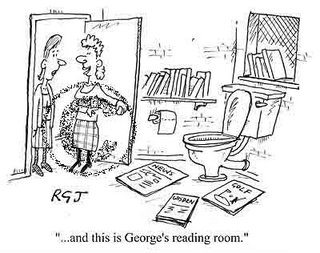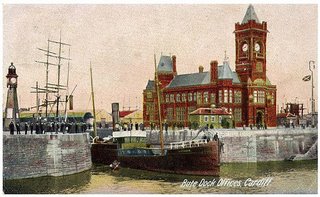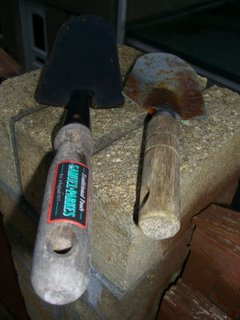
For a frustrated pyromaniac like me, the fact that the actual day of November the 5th was a Sunday and therefore people set off their fireworks on the Saturday, thus creating a two day Guy Fawkes Night spectacle was a Good Thing. With the house perched as it is we have a panoramic view of the whole of the south of Cardiff and surrounding hilly estates and can merrily count up the millions of pounds launched into the sky with cheerfully detached enjoyment. Also, you might think, a golden opportunity for Day Three of the Photographic Experiment to include spectacular bursts of fiery colour. Well, you will have to judge for yourselves. Never mind, there’s always next year and, if I’m lucky, the Christmas and New Year Celebrations in Catalonia!
Half term has ended and the real hard slog towards Christmas has begun. The autumn term should be one of the most rewarding in the school year; this is the term when the back of the year’s work has to be broken if you are not to spend the rest of the year trying to catch up. It is the term when, the pupils still being relatively fresh, they can gobble up some of the educational dainties spread before them with visible results!

It is also the term, however, of started theory driven educational initiatives spawned out of fear of Inspectors; coursework; fine tuning of, or sometimes wholesale reworking of, specifications; coursework; absence of colleagues through illness and the Grim Reaper; coursework; non arrival of oft promised teaching material and resources; coursework; the arrival of new colleagues and the sickening knowledge that there will be two more terms to go after this one before the sort of holiday in which you can really recuperate! Not something I miss.
Though in an abstract sort of way I do miss teaching. That is the actual standing up in front of a class sort of teaching; not the sort that needs complex administration! Once or twice in the past few months I have found myself in the sort of situation when somebody needs to say something to get something done; and I open my mouth and inside my head I can hear the Old Teacher still alive and kicking. There is the automatic saying of something three times before you believe that anyone has understood anything; the note of authority wrapped in a tinge of egalitarianism; the Teacher Look; the . . . the other things that make teaching such a life changer and a character developer!
Talking of developing characters, I listened with triumphant complacency to the news report that recounted the results of a survey which noted that British teenagers are the worst behaved in Europe. Such news must be a godsend to the tabloid press and a quarter of a million teachers!
I shudder to think what The Sun and, more particularly, the obnoxious Daily Mail made of such rich pickings. Ugh!
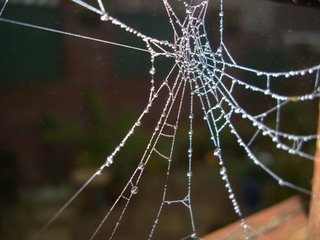
I was more interested in thinking about what the pundits (self styled) made of it all, especially in their analysis of the possible reasons for our lowly position. (Sorry Daily Mail not 'innate evil' in all young people under the age of twenty five.)
Many concentrated on the finding that young people in Britain tend to spend much more time with their own age group than with their parents or other adults. The modern habit of ‘grazing’ for food; the lack of family meals and the lack of adult organised ‘activities’ were all cited as part of the reason together with the lack of a town square.
Now, forgive me if I’m wrong, but I cannot recall frolicking at the feet of my parents as they sipped a glass of wine in one of the many boulevard cafes of Whitchurch Road, watching the evening promenade along Dogfield Street with the distant sound of the fountains gushing heavenwards in the town square of Cathays! And I don’t recall my parents recounting such idyllic scenes in the Blaengwynfi, Mountain Ash or Maesteg of their childhoods and adolescence! This has never happened in these damp and gloomy climes. We must surely look elsewhere for the real reasons.
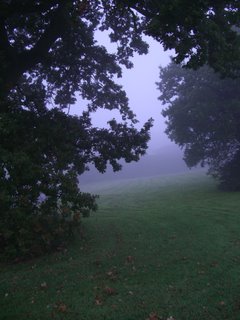
Taking the age of the youngest teenager today and adding to it the likely age of a young parent we get a figure of something like thirty five. That would give us the date of about 1970 for the birth of the parents. What was happening in 1970? Heath became Prime Minister and oversaw a period of something close to economic chaos, not made much better by the Labour Government which followed him and, by the time our young parents to be were nine years old, and beginning to take an interest in the world around them, they were citizens of a country which had as its Prime Minister Margaret Hilda Thatcher and the start of eighteen years of Conservative rule.
I used to blame Thatcher for most things that went wrong, and lots of times I still do, but the one unforgivable element in her attitude was to create generations of self seeking what-can-I-get-out-of-it children; as a head teacher is responsible for the ethos of the school, so a prime minister is responsible for the general attitude of a country profile, and her deep selfishness transmitted itself to young minds. Those corrupted youngsters are the parents of the worst teenagers in Europe today.

It’s worth quoting what are perhaps Margaret Thatcher’s most famous quote and one which has been taken as the epitaph for the eighties, “there is no such thing as society.” The quotation in full is taken from an interview with Woman magazine in October 1987.
"I think we've been through a period where too many people have been given to understand that if they have a problem, it's the government's job to cope with it. 'I have a problem, I'll get a grant.' 'I'm homeless, the government must house me.' They're casting their problem on society. And, you know, there is no such thing as society. There are individual men and women, and there are families. And no government can do anything except through people, and people must look to themselves first. It's our duty to look after ourselves and then, also to look after our neighbour. People have got the entitlements too much in mind, without the obligations. There's no such thing as entitlement, unless someone has first met an obligation."

Like Enoch Powell’s ‘Rivers of blood’ speech there is, surprisingly, much with which I agree: but only if you take the speech as a whole and think hard about the philosophy behind the words. A politician knows that a whole speech is not a sound bite and they are perfectly capable of reading the public mood and providing the titbit that the media likes while hiding behind the casuistry of the excuse, ‘but I didn’t say just that you have to read all of it.’ Enoch was a wrong-headed rabble rouser and Thatcher revealed her true sentiments in this speech, not in her theoretical explanation, but rather in the popular reading which urged those 'with' to realise that those 'without' were coming to take everything they had. We should be so lucky in this country! Revolution? What revolution?
So, our young parents will have come to maturity and childbearing hearing, subliminally, the banned verse of ‘All things bright and beautiful’ ringing in their ears:
The rich man at his table,
The poor man at his gate;
God made them high and lowly,
And ordered their estate.
Hardly surprising that their progeny is not the most socially conscious generation that this country has produced.
Generalisations are dangerous and tempting!
I know that this analysis (if it deserves that appellation) is simplistic in the extreme but, for a man with a Margaret Thatcher candle, waiting for the obsequies to start before ignition, it has a sort of ‘rightness’ to it.
 The rain continues: viciousness combined with vindictiveness and a personal animosity, character testing, will sapping moisture. If I spend another Christmas in this god forsaken water washed sun denied apology for a country in which I will not be able to top up my tan I will not be responsible for my writing. And the food . . . don't start me!
The rain continues: viciousness combined with vindictiveness and a personal animosity, character testing, will sapping moisture. If I spend another Christmas in this god forsaken water washed sun denied apology for a country in which I will not be able to top up my tan I will not be responsible for my writing. And the food . . . don't start me!